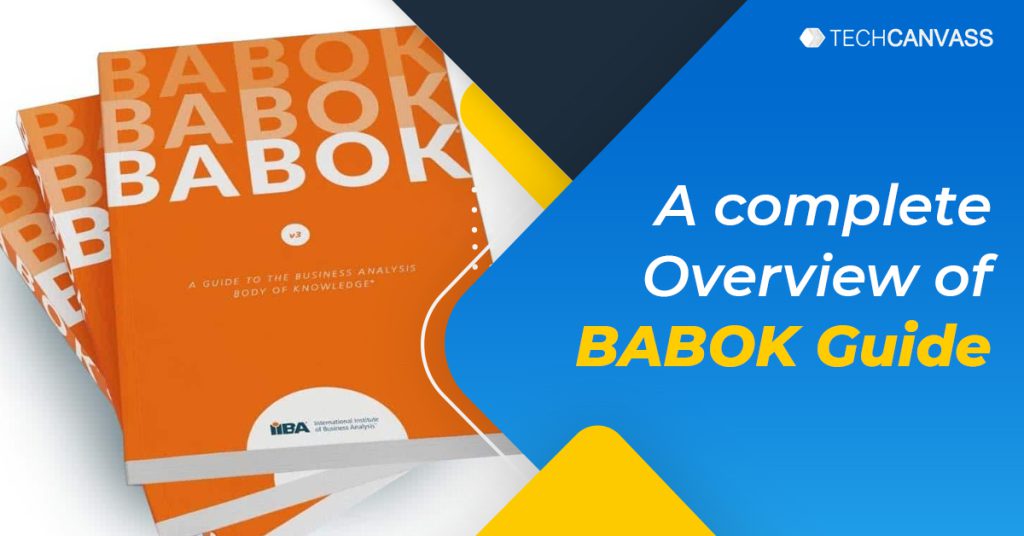This article introduces the Business Analysis Body of Knowledge (BABOK) Guide. BABOK Guide is the official guide for all IIBA examinations for Business Analysts Certification. It’s a comprehensive guide for understanding the Business Analysis practice.
The BABOK Guide can drive business results and career advancement by employing successful Agile Business Analysis. It describes both the mentality and the actions that will assist you in using continuous feedback and quick learning to prioritize delivery, minimize waste, achieve better business outcomes, and maximize the value delivered.
Implementing a Business Analysis Body of Knowledge (BABOK) Practice at work aims to improve an organization’s workflow by demonstrating its influence on the workplace. While putting a technique into practice, especially for beginners, to achieve better business outcomes that bring actual value to both the business and the customer.
Key Concepts in The BABOK Guide
The BABOK Guide covers several essential themes, including strategies for:
- Identifying a business requirement.
- Identifying the resources that will be necessary to achieve the business requirement.
- Users, consumers, and other stakeholders relevant input are being gathered and confirmed by the team.
- Defining and modelling requirements, as well as designing solution architectures
- Data is being used to model potential solutions.
- Identifying and evaluating the value that each offered solution model offers.
- Making enhancements to a proposed solution model would raise the model’s value.
- Managing and arranging the business data required to document the success or failure of a given solution is a challenging task.
- From the beginning to the end, maintaining control and retaining requirements and design knowledge.
BABOK Certifications
The BABOK Guide is used as the reference book for four certification levels in Business Analytics:
- ECBA – Entry Certificate in Business Analysis | ECBA Certification Training
- CCBA – Certification of Capability in Business Analysis | CCBA Certification Training
- CBAP – Certified Business Analysis Professional | CBAP Certification Training
- CBATL – Certified Business Analysis Thought Leader
BABOK Guide Architecture
What is the Architecture of the BABOK® Guide? The guide comprises five essential elements. These elements are:
Let’s look at each of these elements.
Core Concepts
Core Concepts are fundamental to the practice of business analysis as defined in the Business Analysis body of knowledge (BABOK) Guide. The Business Analysis practice, as described in the BABOK Guide, is based on these Core Concepts and is part of the Business Analysis Core Concepts Model (BACCM).
The Business Analysis practice has been divided into different Knowledge Areas. These Knowledge Areas cover the entire Business Analysis work areas. Each of these Knowledge Areas is further divided into doable tasks. BABOK Guide describes the functions of each Knowledge Area in a structured and systematic manner. For example:
- Prepare for Elicitation
- Conduct Elicitation
- Confirm Elicitation results
- Communicate Business Analysis information
- Manage Stakeholder Collaboration
Underlying Competencies
As per BABOK Guide, the Underlying Competencies chapter describes the behaviors, characteristics, knowledge, and personal qualities that support the practice of Business Analysis. The Competencies defined in the guide are generic Competencies and applicable to other professional areas.
The Competencies have been divided into 6 categories: analytical thinking and problem solving, communication skills, interaction skills, etc. As you can make out, these Competencies may apply to other professional areas.
Techniques
The BABOK Guide enlists Techniques for each of the tasks under knowledge areas. A Business Analyst can use these Techniques to accomplish the tasks. The guide has picked up the most used and common Techniques. Business Analysts apply their experience and judgment in determining which Techniques are appropriate to a given situation.
Perspectives
Perspectives are one of the core concepts, which focuses on the Business Analysis activity for each project. For example, AGILE is one of the perspectives indicating that the Business Analysis activities have to be applied and used with AGILE perspective rather than a traditional project perspective.
BABOK Guide For ECBA
The BABOK Guide is built around a knowledge area collection of knowledge areas for ECBA that guides Business Analysts through their work at any stage of the project or product life cycle. Knowledge areas outlined in a BABOK Guide signify what Business Analysts must know and what duties they must complete.
The BABOK Guide defines six knowledge categories and you’ll need to learn the high-level definitions of each knowledge area, as well as the more detailed activities, elements, inputs, and outputs if you plan to take the ECBA exam. If you want to utilize these knowledge areas in the workplace, you’ll need to master the tasks and abilities necessary to become a successful Business Analyst.
The six areas of knowledge listed below are:
- Business Analysis Planning and Monitoring
- Elicitation and Collaboration
- Requirements Life Cycle Management
- Strategy Analysis
- Requirements Analysis and Design Definition
- Solution Evaluation
Conclusion
It is critical to becoming familiar with BABOK terminology if you are new to business analysis to pass the ECBA exam, as many questions will be definition-based. Becoming familiar with BABOK glossary terminology can also help you become more proficient in business jargon, which will help you appear more credible during business interviews
FAQs
By becoming a member of IIBA, you will receive a free copy of BABoK. Membership in the IIBA can cost anything from $55 to $125 per year. Your certification examination price is lowered by $125 due to becoming a member.
BABOK framework explains what business analysis is, what tasks are done as part of it, and what approaches and competencies are needed to complete the tasks.
BABOK 3.0 is the most recent version, and It was published on April 15th, 2015
The two-page matrix type summary of BABOK v3 shows:
CRUD (create, read, update, delete) type analysis of Inputs and Outputs versus the complete BABOK Task list.
1. Stakeholders versus Task
2. Techniques versus Tasks.
BABOK is not a methodology but it includes selecting/ creating methodology & planning individual activities, tasks, & deliverables.
You can view our YouTube video, the Techcanvass speaker talks about the BABOK Guide.



